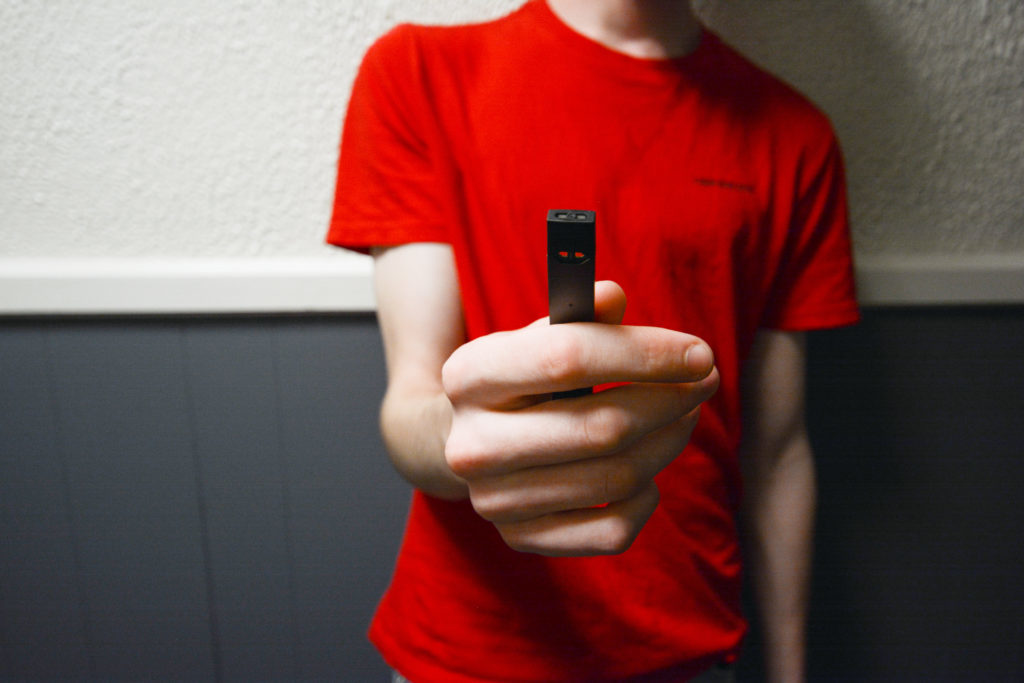Two D.C. councilmembers want to ban electronic cigarette sales, but students who use the product said easy access to e-cigarettes in neighboring states would prevent the legislation from being effective.
Ward 3 Councilmember and law professor Mary Cheh introduced a bill last week that would ban the sale of all flavored e-cigarettes, and Ward 7 Councilmember Vincent Gray introduced legislation that would ban the sale of e-cigarettes unless they are used with medical marijuana. In interviews, more than 15 students said they can easily access the Metro to reach nearby states with relatively relaxed laws and purchase e-cigarettes.
“What is most concerning to me is that a new generation of young people can get hooked on nicotine through vaping and electronic smoking,” Gray said in a release.
The D.C. Council implemented a minimum age limit of 21 to purchase any nicotine or tobacco product in 2016. Eighteen states and D.C. have implemented a minimum age of 21 to purchase tobacco products to prevent the youth from using nicotine.
Gray said he will hold a hearing on both the e-cigarette legislation and a second vaping products legislation he co-introduced to combat the “emerging health crisis” caused by vaping.
“Until more is known about the long-term adverse health impact of vaping, any use of electronic smoking devices and vaping products should be carefully monitored by a physician through a prescription,” Gray said in the release.
Cheh and Gray did not return requests for comment.
The proposed legislation comes one week after President Donald Trump announced plans to ban electronic cigarettes in the United States, citing a growing number of underage users addicted to nicotine. Research from the School of Medicine and Health Science released in March found that using e-cigarettes can double the risk of heart attacks.
The CEO of Juul, a brand of e-cigarettes, stepped down from his position Wednesday and pledged that Juul will not lobby the Trump administration about its proposed ban on e-cigarettes.
Students said that if the D.C. Council passes Gray and Cheh’s legislation, they will likely still find ways to purchase e-cigarettes by traveling to Maryland or Virginia, where the minimum age to purchase e-cigarettes is 18. Maryland will boost the minimum age to 21 for those purchasing nicotine or tobacco products in October.
A junior, who uses e-cigarettes and spoke on the condition of anonymity because smoking is against University policy, said scientific studies showing that e-cigarettes may lead to heart and lung problems have not deterred him from vaping because he uses the product as an alternative to smoking tobacco. He said he hated the smell of tobacco and felt short of breath when he smoked.
“People and politicians think, ‘Oh, kids think its great and good for them because it tastes like cotton candy or whatever,’” he said. “I just use mint. I don’t like those flavors, but I have no illusions it’s good for me.”
He said the ban would not impact his own e-cigarette usage because he purchases the product in Maryland, but he hopes the legislation would curb underage users from becoming hooked on nicotine at a young age.
“Young kids probably shouldn’t be getting into it,” he said. “I guess if it’s keeping it out of high schools it would be fine.”
A freshman, who uses e-cigarettes and spoke on the condition of anonymity because vaping on campus is against University policy, said she Juuls “for fun” and would find other ways to purchase e-cigarettes outside of the District.
“I’m sure that not everyone will continue to use Juuls if it’s just so inaccessible, but I think that I’ll just still do it when I’m home and bring stuff back to school if really gets to the point where you’d really not be able to buy here anymore,” she said.
A junior, who uses e-cigarettes and spoke on the condition of anonymity citing University policies, said councilmembers’ legislation wouldn’t really affect his e-cigarette use because he would go to Maryland, where the purchase of e-cigarettes are not banned, to buy products.
“I already do because it’s 21 to buy e-cigarette stuff in D.C., anyways so it’s not huge,” they said.
A senior in the School of Business who uses e-cigarettes and spoke anonymously said the ban could prompt people who used e-cigarettes to quit smoking tobacco and start smoking regular cigarettes again.
“If they ban e-cigarettes, I am going to smoke cigarettes,” he said. “I use e-cigarettes to try to quit smoking and if they ban them it’s hard to just stop smoking without the use of e-cigarettes.”
Sophomore Simon Salby said he used to use e-cigarettes but quit after studies revealed that e-cigarettes are detrimental to users’ health. Salby said the ban could lead to District residents purchasing nicotine products in different states or reproducing e-cigarette products privately.
“If there is a ban on e-cigarette juices then people will start to make fake ones which could have even worse health hazards,” he said.





